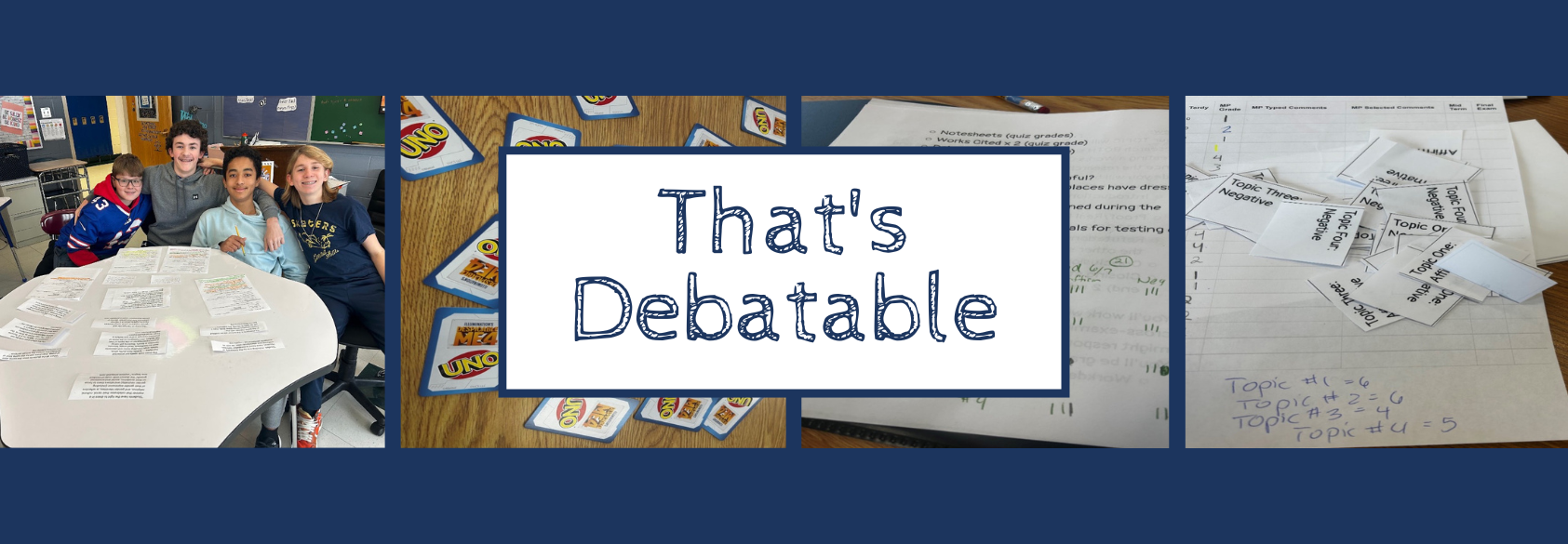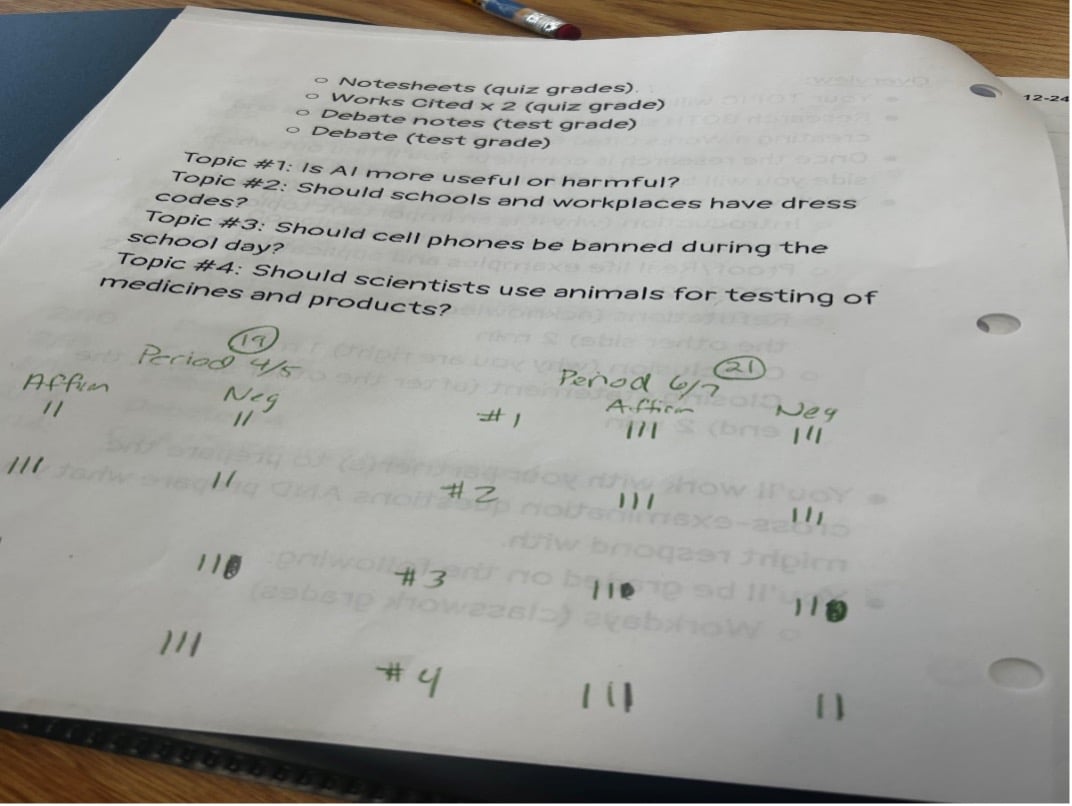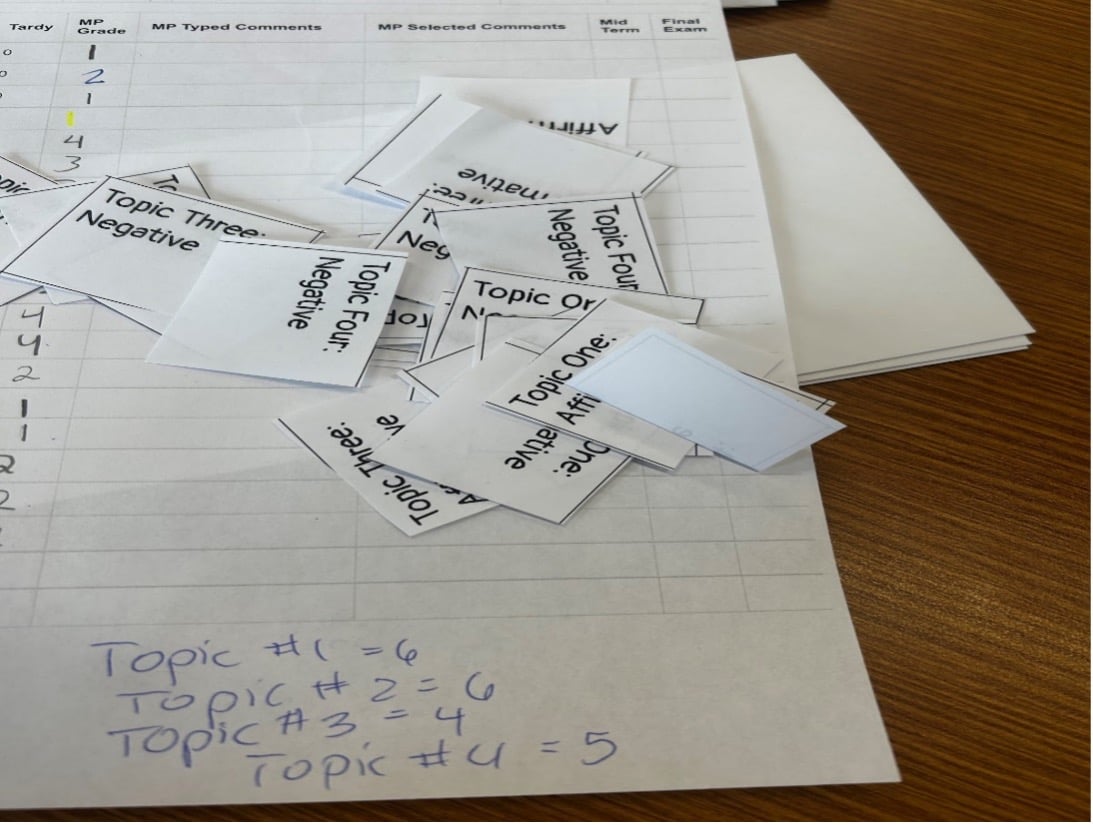That's Debatable: Should You Give Debates a Try?
Amber Chandler shares how she revived classroom debates, navigated the challenges, and discovered why they are a powerful and memorable learning experience for middle schoolers.

Share
March 5, 2025
Amber Chandler shares how she revived classroom debates, navigated the challenges, and discovered why they are a powerful and memorable learning experience for middle schoolers.
Share
Living in the same community where you teach is a double-edged sword. On the one hand, I don’t love running into students or their parents when I run to the 7-11 at 8:30 p.m. in below-zero temperatures while wearing my fuzzy pajama bottoms, my husband's coat, and without a stitch of makeup. However, I’ve found that running into my students as adults is incredibly rewarding because it allows me to hear whether the work we do in eighth grade either “sticks” or it doesn’t. For example, my co-teacher came in the other morning and told me all about a former student who asked if we were still reading The Giver and doing our Utopia Project. We haven’t, since COVID-19, but based on his recommendation, it is going to make a comeback next year. Checking out at the grocery store back in November, a now 23-year-old former student, told me that her favorite thing we did in our class were the debates. She remembered that we read Flowers for Algernon and then debated animal testing. This was a decade ago, so if it stuck with her, I figured it was time to bring it back. (Here’s the Share My Lesson resource for the debate.) Why had I stopped doing debates in the first place? When I think about it, it is simply because it requires a lot of pre-planning, time and organization, and it was put on the back burner. In the end, are debates worth it? They are labor intensive. They require a certain level of controlled chaos. The logistical planning is stressful. And, as all teachers know, best-laid plans rarely are carried out like we planned them in our heads.
Earlier this year, I experimented with a Constructivist approach to my unit planning, and the Honors students wanted to make sure they knew how to research, and admitted that public speaking was a hurdle they’d like to overcome before taking Pre-AP English at the high school. Debates fit the bill, so the planning began. First and foremost, I had to find out when our librarian could work with us to learn how to use databases because that was one of the key outcomes we were working toward. I guessed that the students would need six days in the library, which sounds like a lot, but I’ll explain more about that below. Then, they’d need four days to work together in their teams, and then they’d need four days for the actual debate. I also always build in a day to debrief after big units like this, so this debate unit landed at three weeks. I then figured out what parts I’d actually grade vs. what parts I’d provide feedback informally. I decided to grade their note sheets as a quiz grade, their works cited as a double quiz grade, their debate notes as a test grade, and the actual debate as a test grade.
Once those logistics were set, I needed to add some novelty and stir things up a little bit. Of all the strategies I’ve developed over the years, incorporating novelty is probably one of the most impactful. This blog series explains why, but in a nutshell: School can be monotonous, routine is crucial, but finding ways to get kids excited while being in comfortable routines is amazing for student retention. This Cult of Pedagogy blog shares some excellent tips on how to incorporate novelty, and Chris Dunkel explains why in his article “The Brain Science of Novelty.” “When we experience something for the first time or in a new way, our brains receive a burst of dopamine, often referred to as the “happy hormone” because it is a primary part of our brain’s reward system.”
Students were introduced to the topics, and then they had to draw a Uno card to determine which topic they’d be researching. This was only to determine their topic, as they quickly learned, because they’d be researching both sides. I pointed out that the best way to prepare for the other side’s argument is to know what their argument would be.


The librarian spent a day on databases, and students then began two days of research for each side. On the sixth day, students organized their information and brainstormed their best arguments for each side. Remember, at this point, they didn’t know which side they were on. Then, we returned to the classroom where they drew to find out which side they’d be debating and who their partners would be. As you might expect, middle schoolers moaned and groaned, freaked out when they got the opposite side than what they believed personally, and faced some awkwardness about working with people they may not know. However, those elements are exactly what makes this memorable and “sticky” for their learning. “Sticky Teaching” on the Association for Psychological Science website provides a good breakdown of why the “sticky” factor matters so much.

Once they are on their teams, they have four days to compare research, make notecards and generally get on the same page. I facilitate this by circulating and breaking any awkward silences as the students get started.
So, here’s the thing: If you’ve been teaching for any time at all, you might have guessed that three weeks didn’t go by without some changes to plans. Let’s just say things went off the rails due to two snow days, and my absence for three days. I’ll spare you the whole story, but you can read about it here in my “Bouncing Back” blog. As all teachers must do, I improvised. We were up against our February break, and there was no way I’d push this until after the break. Instead of doing the debates at full scale, we figured out together how to do an in-class version instead of the library (which was now booked because our schedule was off). They were a bit disappointed, as was I, but I added another twist to keep it interesting. I invited all of our building administrators, and our central office folks, to stop in. Over the course of the four days, our superintendent, both of our assistant principals, and our principal came to see them in action.
When we debriefed, we talked about resilience, flexibility and the value of being able to think on their feet. One student had a comically large number of notes (which, incidentally, helped him “win” the debate), and I asked to snap a picture. It turned out that it captured the vibe really well, and he asked me to send him a copy of it. When I did, I asked if I could use it in this blog. This was the response:


Were the debates worth all of the planning, the logistics, the organization, the changes, and the overall controlled chaos? To me, it isn’t even debatable.
Stressed? Tired? Frustrated? Join Amber Chandler for this free, for-credit session. She will share strategies that will cut all the busy work in half. Tips for grading? Yep. Tips for time management? Yep. Tips for Serotonin seekers? This session has it. Teachers have repeatedly been asked to do more with less, all while gathering data about it!
Access 35+ free, one-hour professional development webinars—anytime, anywhere. Explore the topics that matter most to you, earn PD credit, and grow your skills at your own pace.
